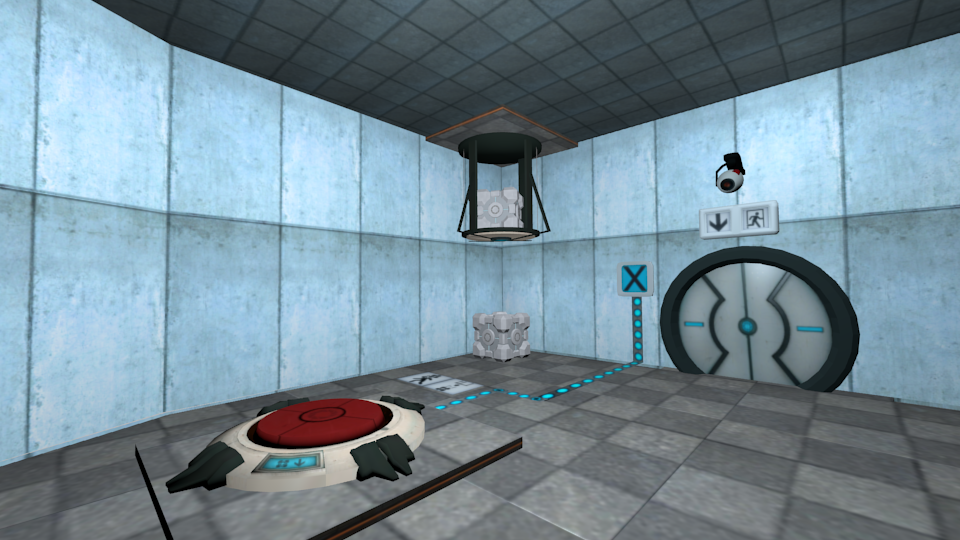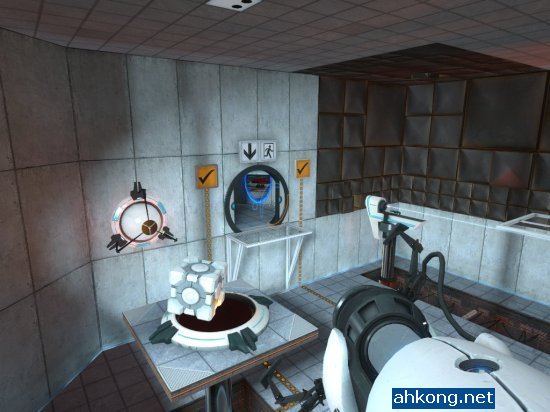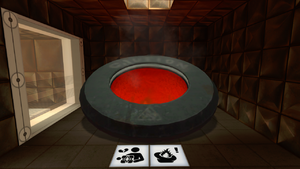Welcome back to Highlights,
the series where we talk about memorable moments from memorable games, movies,
comics, books, shows, and more. Today we’ll do what I’ve wanted to do for a few
posts now, video games. And I think we can all agree this one has memorable
moments worth discussing. Portal.
Portal is that
rare game that comes along and is designed so tightly and thoroughly that
nothing feels unnecessary and everything fits perfectly. In short, it’s
probably the closest we’ll see in gaming to a perfect game because it did what
the developers set out to do just right. Few games ever live up to that
expectation. So what moments do we remember from Portal that bring this near perfect game to life?
First Turret
Encounter
 Upon entering, GlaDOS says these chambers were for old
military testing and you’re only here because of a “slight” detour. We all know
this is GlaDOS’ attempt to kill you more quickly as you’ve progressed so far.
From a developer perspective, the first encounter with the turrets is to slowly
get you adapted to how they function and how to get around them. This way you
know best how to deal with the final maps of the game. And you really aren’t
doing any new tricks with your portals here. It’s just familiar tricks to
dispatch new obstacles, pushing forth the notion of trial and error that makes
a puzzle game like Portal so spectacular.
Upon entering, GlaDOS says these chambers were for old
military testing and you’re only here because of a “slight” detour. We all know
this is GlaDOS’ attempt to kill you more quickly as you’ve progressed so far.
From a developer perspective, the first encounter with the turrets is to slowly
get you adapted to how they function and how to get around them. This way you
know best how to deal with the final maps of the game. And you really aren’t
doing any new tricks with your portals here. It’s just familiar tricks to
dispatch new obstacles, pushing forth the notion of trial and error that makes
a puzzle game like Portal so spectacular.
And what makes the encounter even more unsettling is the
fact the turrets will speak. Once out of line-of-sight, the turrets will ask if
you’re still there. Their voice is both cute and haunting, knowing that their
sole purpose is to end your life by orders of the only voice who’s been
“guiding” you out of these test chambers. All of this makes the first encounter
with a turret very unsettling but sets the tone in an absolutely brilliant way,
while sticking to the tone of the dark-humor the game has already been throwing
your way throughout bits and pieces of the experience.
The First Chamber
It doesn’t seem like much, does it? You enter a room. You
place a block on a button. You’re out of the room. So why is it here? It’s the
first puzzle in the game. For those of us who quickly adapted to this game, I’m
sure many of us looked at this puzzle the first time and said, “Really? This is
the puzzle game people say is amazing?” Little did we know this was just a
brief tutorial as the many rumors that followed would require blocks on
buttons. By illustrating how the blocks function in the most in-your-face way
possible, it would be impossible to not figure out how to deal with those later
puzzles. In short, yes, it seems insultingly easy, but the goal of that first
puzzle is to make sure everyone is on the same page whether it’s their first
game, first playthrough of this game, or first playthrough of this game on this
particular day.
 A very similar puzzle is brought back in Portal 2 when (SPOILERS) Wheatley takes
over the facility. It is the first puzzle he creates and the solution is just
pushing a button. He’s so proud of his creation, believing it to be the most
difficult puzzle. So proud, in fact, he forces you to solve it more than once,
believing you beating it so quickly is nothing more than a fluke. A way to
highlight the less than impressive intellect of Wheatley (just don’t call him a
“moron”)
A very similar puzzle is brought back in Portal 2 when (SPOILERS) Wheatley takes
over the facility. It is the first puzzle he creates and the solution is just
pushing a button. He’s so proud of his creation, believing it to be the most
difficult puzzle. So proud, in fact, he forces you to solve it more than once,
believing you beating it so quickly is nothing more than a fluke. A way to
highlight the less than impressive intellect of Wheatley (just don’t call him a
“moron”)
But this is why I love Portal
so much, and possibly more than Portal 2.
It’s about providing a very small and simple concept and then just expanding
upon it with each successive level or puzzle or challenge. We could have gone
straight to shooting portals and complex puzzles. But it makes more sense for
us to know the most very basic aspect of the puzzles, which would be
manipulating objects in the environment without the portal gun. And, hell, you
don’t even get a full portal gun until several chapters in so you can learn how
to function with just one portal at a time.
The Unsolvable Room
At a certain point in Portal,
you get put in a room in which GlaDOS states that the room is impossible to escape
and this is a flaw with the test chamber. If she were telling the truth, you
would die and never escape. But since we, as gamers, should be smart enough to
figure out a solution to getting out of this supposedly inescapable room, we
do. And GlaDOS acts surprised when you do. Okay, fine, so we outsmart the
machine again. That’s the point of the whole game, so why bring this up?
 This is one of the first moments in the game when you can confirm
GlaDOS is lying to you. Prior to this, you’re never really sure, but you have
no reason to doubt her because she’s the only voice you’ve encountered. There
are moments when there are audio quirks (intentional) which can cause some
doubt. But nothing that conflicts with the physical truth before you. The
moment this lie occurs, you immediately click in your mind that something is
off about this facility beyond the machinations having some kinks to them.
This is one of the first moments in the game when you can confirm
GlaDOS is lying to you. Prior to this, you’re never really sure, but you have
no reason to doubt her because she’s the only voice you’ve encountered. There
are moments when there are audio quirks (intentional) which can cause some
doubt. But nothing that conflicts with the physical truth before you. The
moment this lie occurs, you immediately click in your mind that something is
off about this facility beyond the machinations having some kinks to them.
And, as you progress, you receive more lies. All of which
are subtle, but all of which are highly suspect from the promise of cake, to
the strange description of the companion cube, and even to the whole detour
through the turret-laden path you’re forced to endure. But, GlaDOS is a
machine, and machines shouldn’t be capable of lying. Thus, this little lie is
the first hint in the game that GlaDOS and Aperture are more than they appear
and it’s at this point when the player brings their guard up and prepares for
the real dangers ahead.
The Companion Cube
And Final Battle
No, these are not in the same area. But they do tie together
in terms of game-mechanics and because discussions on both the Companion Cube
and the final battle with GlaDOS have been done to death, I’ll only touch on
them a little bit (especially since this article is running a little long). I
find the Companion Cube memorable not because of its unique design or because
GlaDOS told us to. I find the Companion cube memorable because of the
information we’re meant to infer from the clues in the game to the secret
behind the Companion Cube. But rather than rehash a popular YouTube video, I’ll
just throw a link down HERE to Game Theory’s thoughts on the Companion Cube
actually being stuffed with former employees of Aperture. There’s some damning
evidence to support that claim and you should definitely check out THIS LINK if
you’re at all curious.
 But from a gameplay standpoint, this is because, in order to
defeat GlaDOS at the very end, you must throw the component’s she drops into
the incinerator near her. But because such a concept was never introduced, the
developers worried no one would get that’s what the incinerator was for and be
unable to complete the game. Therefore, they force you to use the incinerator
once to tech you this game mechanic before it becomes vital for success. As an
added bonus, they probably hoped you were still pissed off about being forced
to use the incinerator by GlaDOS that this little revenge would be all the more
satisfying.
But from a gameplay standpoint, this is because, in order to
defeat GlaDOS at the very end, you must throw the component’s she drops into
the incinerator near her. But because such a concept was never introduced, the
developers worried no one would get that’s what the incinerator was for and be
unable to complete the game. Therefore, they force you to use the incinerator
once to tech you this game mechanic before it becomes vital for success. As an
added bonus, they probably hoped you were still pissed off about being forced
to use the incinerator by GlaDOS that this little revenge would be all the more
satisfying.
There are plenty of other memorable moments worth
discussing, but we’ll save those for another time. In the meantime, are there
any moments you felt we should have mentioned? Please be sure to tell us in the
comments below! As always, we’d love a comment, like, share, and subscribe if
you enjoyed out content. We’ll be back with more Highlights.







No comments:
Post a Comment